What’s Available on Hospedia Bedside Units
23 minute read | 15/07/2022
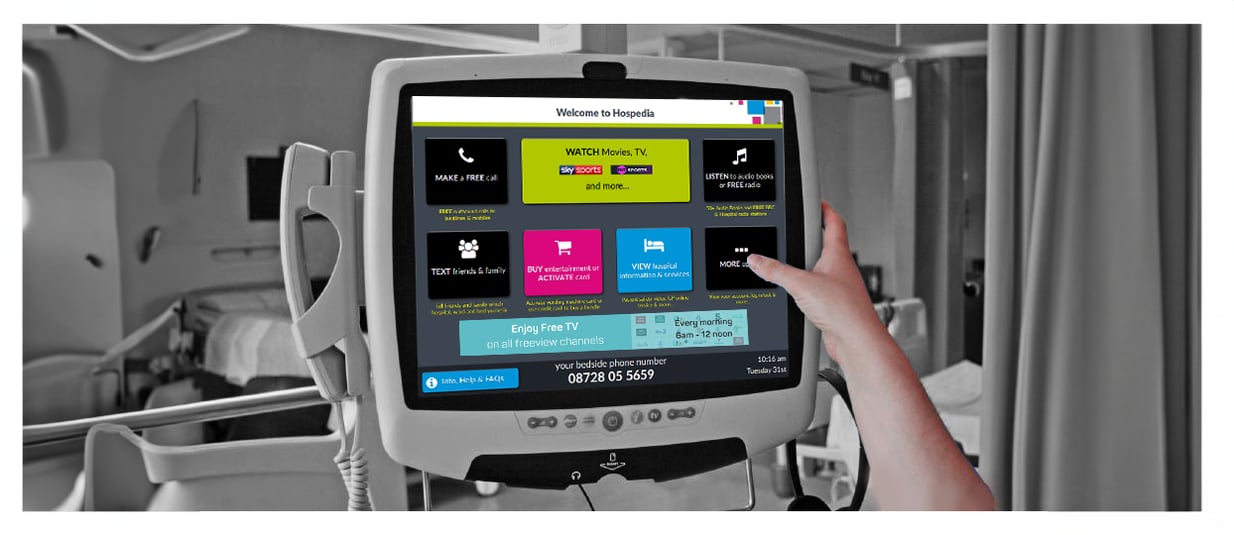
You may have seen these rectangular boxes on metallic arms that are pushed against the wall while you’ve been in a hospital bed. Some people may think, “They look a bit chunky, they’re probably some kind of medical equipment, I better not touch that.” When they are in fact, incorrect. Give them a spin around and you’ll find your own personal TV! But they are more than just a TV. You will also have access to a plethora of entertainment services and hospital information at your fingertips.
Learn more about the different technologies, capabilities and features to get the most out of your Bedside Unit while in hospital.
- Types of Bedside Units
- T2 Remote Control Units
- T3 Touch Screen Units
- Why do Patients Have to Pay for Entertainment?
- How We're Making Hospital TV Packages in the UK Free
- Support for Hospedia Bedside Units
Types of Bedside Units
There are two main types of technology, the T2 remote control units and the T3 touch screen units. The T3 has more features than the T2 which will be detailed below. With both types of technology, the patient doesn’t have to create an account if they just wish to access the free features. There is a paywall to be able to access certain entertainment options where they would need to create an account.
Learn how to create an account and more by visiting our YouTube Playlist.
Patients don’t need to be worried about being charged for using the Bedside Units unless they explicitly choose to do so for a set period. However, family/friends who call to their loved one's bedside number (displayed at the bottom of the screen on the home page) will be charged. To cover the cost of running the service, we charge 13p per minute. However, the caller can also be charged up to 65p on top of that because of their network operator.
SPARK® TSL acquired Hospedia in 2021 because we have a vision to remove the patient pays model. We believe that no patient should have to pay for entertainment. Find out how we’re going to do it.
T2 Remote Control Bedside Units
They have a phone on the left and a controller on the right which you have to use to navigate the screen.
There are two sub versions of the T2. The T2D (digital) and T2A (analogue). There are slight differences between the two but they can’t be physically told apart.
There are several entertainment features, some of which have to be paid for.
Entertainment 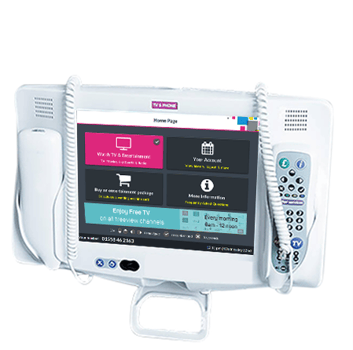
What’s Free
- TV from 6am till 12pm on over 15 free view channels.
- Children’s TV from 6am till 9pm over 15 free view channels.
- A selection of free radio channels including hospital radio.
Watch this video on how to access free entertainment.
Premium Entertainment
- Movies (On T2A there are more than 50 movies scheduled over 9 film channels. T2D there are over 75 movies on demand).
- TV (past 12pm for adults and 9pm for children).
- Sports through SKY (This is an add on package along with TV).
Learn how to pay for entertainment here.
Communication
What’s Free
- Unlimited 2-minute calls from your bedside to 07 numbers.
- Unrestricted outbound calls to 01/02/03 numbers.
To make a call, the patient needs to pick up the phone and turn it around. There they will find a keypad as well as a green operator button which will take them to our customer care team.
Patient safety video
There is an animated video on the Bedside Units which shows the patient how to stay safe in hospital and informs them of some standard procedures for their stay. On T2A, this video plays at the end of the idle video that runs on the screen when it’s not been interacted with. It’s like a laptop screensaver. On the T2D’s however, this video must be navigated to.
Learn how to find it by watching this video.
T3 Touch Screen Bedside Units
This version of the Bedside Units is more advanced and hosts more entertainment options and hospital information. As the title suggests, these are touch screens, although they’re not as sensitive as a modern smartphone and will need more of an assertive touch.
Entertainment 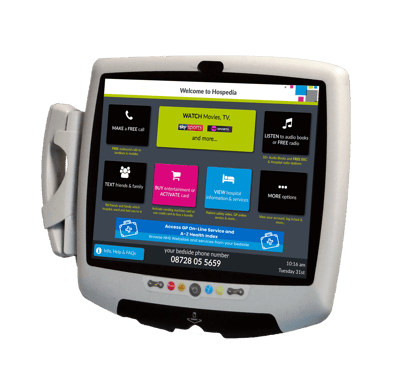
What’s Free
- TV from 6am till 12pm on over 25 channels.
- Children’s TV from 7am till 9pm over 25 channels.
- A selection of free radio channels including Hospital Radio.
- Yahoo internet browser.
Watch this video on how to access free entertainment.
Premium Entertainment
- TV (past 12pm for adults and 9pm for children).
- Movies.
- Audio books.
- TV Box sets.
- Sports through SKY or TNT.
Learn how to purchase an entertainment package by watching this video.
Communication
What’s Free
- Unlimited 2-minute calls from your bedside to 07 numbers.
- Unrestricted outbound calls to 01/02/03 numbers.
To make a call, the patient needs to pick up the phone. This will display a phone screen on the Bedside Unit. They can type in the number of the contact they want to call. Patients can also contact our call centre to purchase an entertainment package by pressing the ‘customer care’ button.
Hospital information
Patients will have access to the following information.
- Patient safety video.
- Access to GP online services to order prescriptions.
- NHS A-Z Health Index.
Watch this video about how to access these features.
However, T3’s are capable of hosting more. Other features that are available include:
- Dementia Orientation Screen.
- Electronic Meal Ordering (EMO).
- Images (menus, hospital map, discharge information etc)
- Links to NHS resources.
- Healthcare videos.
All of these features are available and customisable to the hospitals that have T3 Bedside Units. Unfortunately, not every Trust takes advantage of the full offerings.
Why do Patients Have to Pay for Entertainment?
To properly answer this question, we need to go back in time. Over 20 years ago, Patientline, the founding company of the Bedside Units, invested £150,000,000, at its own cost, worth of infrastructure into the NHS. This equated to the installation of 56,500 bedside units across 160 hospitals, making them the key supplier of bedside terminals to 75% of the UK's acute hospitals.
Trusts and health boards were not required to cover the costs of the Bedside Units as per the initial contracts with Patientline, which resulted in patients having to pay for their usage to keep the service running and the staff supporting it. This patient pays model still stands today. It supports the maintenance of the units which covers 24/7/365 support, health and safety checks, replacement of parts and the engineers that repair the units.
We would love to remove the patient pays model overnight, but if we did this with no alternative funding, hundreds of thousands of patients would not have access to basic entertainment such as TV.
SPARK® TSL is dedicated to removing this patient pays model and we have a plan to do so.
How We're Making Hospital TV Packages in the UK Free
So what’s the big plan? Well, instead of asking patients to pay high charges for certain entertainment services and inbound calls, we are appealing to Trust and Charities to source funding for the service. The current price is due to a lack of utilisation. The more patients that use the Bedside Units, the lower the price can be while still being able to maintain the service. This is why when Trusts fund the cost of TV, it equates to as little as £1 per bed per day (compared to a patient paying much more than that).
This Trust paid solution will remove the cost of TV to patients.
There are more SPARK® TSL solutions available to remove this outdated patient pays model.
- SPARK® Media Bring Your Own Device: This patient entertainment and engagement platform is available on patient and visitors own device. It provides easy access links to entertainment such as sudoku, live TV and the hospital radio. There are several versions of this platform, including SPARK® Media: Lite to get started, and add on's such as digital newspapers and magazines.
SPARK® Media has always been free for end users, however relies on the patient having their own device.
- SPARK® Horizon, upgraded Bedside Units: These modern bedside units host the SPARK® Media software and everything is free for the end user with the cost being covered by Trusts and their Charities. Patient entertainment is an investment to improve the patient experience. However, unlike the legacy Bedside Units, Horizon has the ability to produce tangible ROI through its ability to host apps such as e-prescribing, meal ordering, translation services and more.
The bottom line is that SPARK® TSL does not want to charge patients for entertainment, but measure must be in place before this can happen.
Support for Hospedia Bedside Units
Whether you’re a patient in hospital struggling to use the Bedside Units, a nurse who is trying to support a patient in need or a Trust stakeholder, SPARK® TSL is here to help.
Patients
If you’re struggling to use a Bedside Unit, please visit our resource webpage or our YouTube Playlist. If you still can’t find the answer you’re looking for, you can raise a ticket at our online support desk.
Staff
You can access the same resources above to educate yourself on the Bedside Units to better help patients.
You can call our 24/7/365 support desk to report a fault with the Bedside Units. The number you need is 0345 414 1234. Several options will be read out, press 2 for customer service. In the next set of options, press 1 to report a fault.
You will then be asked leave a message. Please provide the patient's name, hospital name, ward name, bed number and a description of the fault. A ticket will be raised and a member of support will pick it up.
Trust Stakeholders
The power is in your hands to help us remove the patient pays model. Please get in touch with us to find a solution for you.
About the author
Alice Becket
Alice graduated from Plymouth University with an English Literature and Creative Writing degree. She joined SPARK TSL in June 2022 as a Content Specialist in the Marketing department. Alice creatively champions the SPARK Solution, advocating for its ability to alleviate pressure on the NHS.
More articles by the author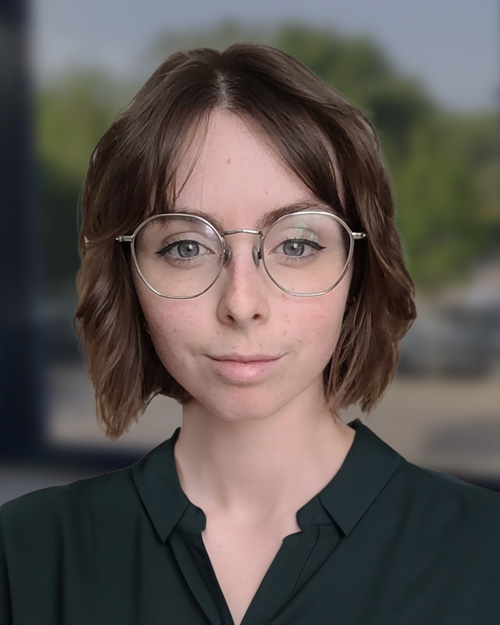
Related articles
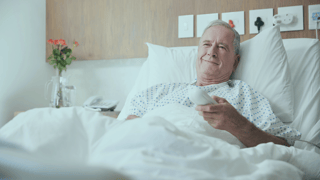 Patient Experience
Patient Experience
Everything You Need to Know About Hospedia Bedside Units
Visiting hospitals can be a stressful experience for patients and their families, making it important to ...
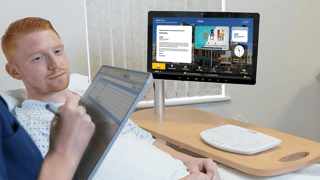 Company News
Company News
Introducing SPARK® Media BSU, the Hospedia Upgrade
If you’ve been to hospital, then you’ve probably seen a Hospedia Bedside Unit – those TV's above a patient ...
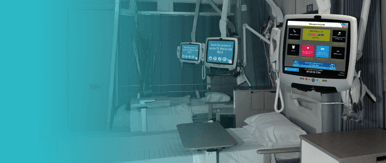 The SPARK Solution
The SPARK Solution
Past, Present and Future of Hospital Bedside Units
Two decades ago, patients had no access to simple services like a telephone at the bedside. They couldn’t ...


